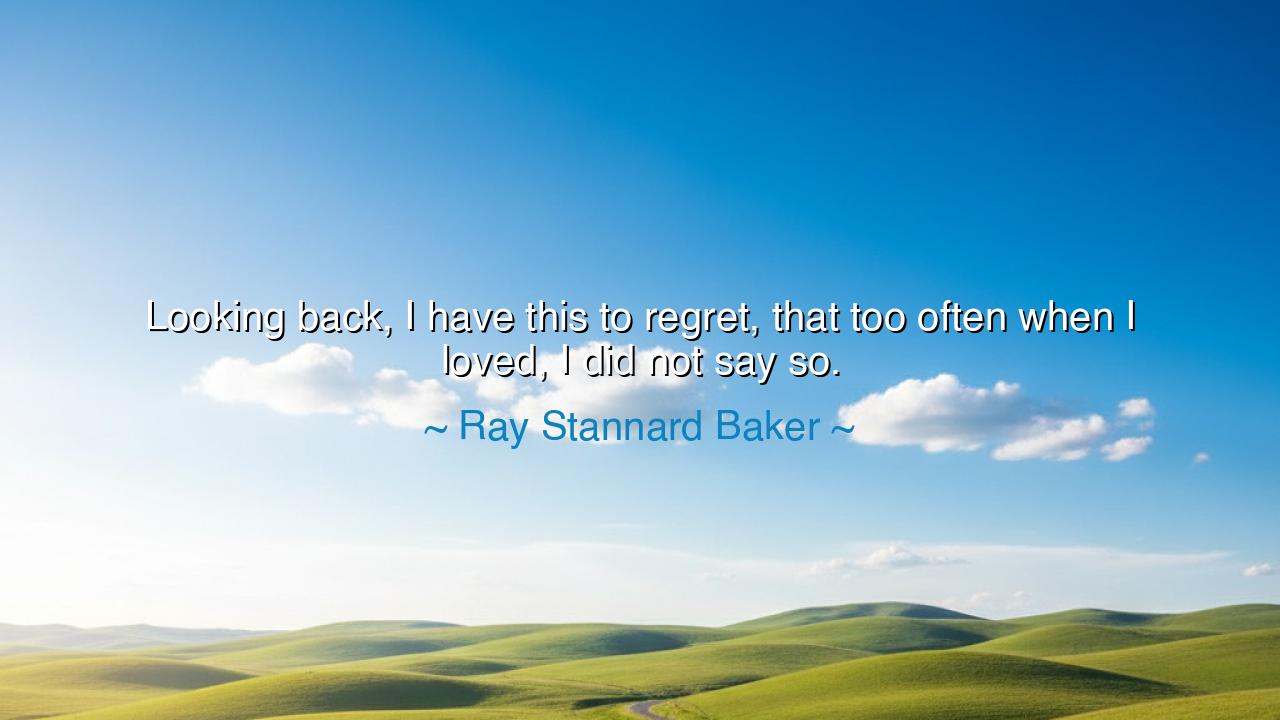
Looking back, I have this to regret, that too often when I loved






Ray Stannard Baker, in his words, “Looking back, I have this to regret, that too often when I loved, I did not say so,” speaks a truth that many of us will recognize as a sorrow of the heart. The words we leave unspoken—the feelings we fail to express—often become our greatest regrets. To love without speaking it, to hold back the words that could have healed or deepened a connection, is a kind of silent loss. This regret, as Baker points out, is not about the love itself, but about the failure to share it, to make it known, to offer it freely and openly. For love, though felt deeply, can only reach its true power when it is expressed. It is in the speaking of love that its deepest truth is revealed.
In the wisdom of the ancients, love was always seen as a sacred force, a gift to be shared. Plato wrote of love in his “Symposium,” exploring the way love can guide the soul toward the divine. But even he understood that love must be communicated. Without expression, love is a seed that never sprouts—it is a fire without flame. Socrates, in his dialogues, often spoke of the power of words, of the need for dialogue to reveal the deeper truths of existence. In this sense, love must be spoken. If we love and remain silent, we deny both ourselves and the one we love the fullness of what could be. It is the act of speaking that allows love to take root in the world.
The story of Orpheus and Eurydice offers a tragic example of love left unspoken. Orpheus, gifted with the power to charm all with his music, loved Eurydice deeply. Yet, when she was taken from him, he descended into the underworld to retrieve her. His music, full of grief and longing, spoke of his love—but he failed to express it in the way that truly mattered. He was given a chance to lead her back to the world of the living, but on the threshold, he doubted, and without speaking his love clearly, he turned to look back, losing her forever. In his heart, he knew he loved her, but he did not have the courage to declare it in the way that would have brought her back. His failure to speak his love in that moment was his downfall.
Consider, too, the love between Helen Keller and her teacher, Anne Sullivan. Keller, deaf and blind from a young age, learned to communicate through the hands of Sullivan. Though Sullivan's care and devotion were evident, Keller often speaks of her regret in not fully articulating her appreciation for the woman who changed her life. The depth of Keller’s gratitude was beyond words, yet the unspoken love she had for Sullivan often went unexpressed, and in moments of reflection, Keller recognized the regret of not saying it enough. In this way, the unspoken love—though deep—was not fully shared, and the bond, though profound, could have been made even deeper with words of affirmation.
In our own lives, regret often surfaces in the quiet spaces where love was left unspoken. How often have we felt love for a friend, a partner, or a family member, yet withheld the words, afraid that they would not be received, or unsure of how they would be taken? The fear of vulnerability, the hesitation to expose the rawness of the heart, leads many to remain silent, even when love is felt most deeply. But as Baker’s words remind us, silence only breeds regret. The words we do not speak—the declarations we withhold—become the heaviest burdens we carry in life. The lesson here is clear: do not wait until it is too late. Speak your love, not only in grand moments but in the quiet, everyday exchanges that form the foundation of meaningful connections.
Take this wisdom into your own life, children of the future: speak your love freely. Do not wait for the perfect moment or the ideal conditions. If your heart is full, let your words flow. Express your love in both big and small ways, for it is in the act of speaking love that it finds its full expression and power. When you love, speak it, show it, and share it. The unspoken love that remains hidden in your heart will only leave you with regret, but the love that you give freely, even in its vulnerability, will bring you closer to the truth of what love is. In doing so, you will create deeper, more meaningful connections, and you will discover that the power of love is in its expression, in the words and deeds that bring it into the world.
In the end, we are all called to live lives not of silence but of boldness—to speak our truth, to show our love, and to express the feelings that connect us to the world. The regret of unspoken love is a burden too heavy to carry. Instead, speak the words that are in your heart, and let your love flow freely, for it is only through expressing love that we discover its true depth.






AAdministratorAdministrator
Welcome, honored guests. Please leave a comment, we will respond soon